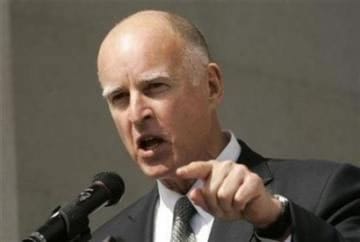Governor Brown proposes major public pension changes


The non-partisan Little Hoover Commission reported in February that the ten biggest pension funds for California public workers face a coming shortfall of $240 billion. These benefits are mandated, must be paid (unless renegotiated), and obviously will decimate the budgets of governments already heavily impacted by budget cuts.
Unions predictably said the report was skewed because it was based on 2008 data, which was during the market crash. But isn't that precisely a telling example of why the current pension system is unsustainable? Of course the market will fluctuate. Public pension fund projections that assume a steady return of 5-7% year after year are fantasy. Instead, especially in these financially unstable times, the market skitters all over the place. But pension obligations are fixed and unchanging. That's the root of the problem. Pensioners require a fixed (and ever-growing) stream of benefits, yet the money funding them comes mostly from investments which, since the real estate crash, produce highly variable income.
By law, if a public state pension fund has a shortfall, it can force the state to make up the difference. Thus, unfunded pension liabilities will inevitably fall upon California taxpayers, and more than a few might get seriously grumpy about paying for state worker pensions while their own private pension may well have been cut.
Recently, Gov. Brown proposed serious changes to the public pension system. They include boosting the retirement age from 55 to 67, making employees pay more for their health care and retirement, creating a hybrid system that moves away from defined-benefits to defined contributions, and ending the odious practices of pension spiking and buying credits. Yet, all of this only applies to future employees. Nothing much changes for current workers. Unions, not surprisingly, are mostly opposed to this, while taxpayer groups say it doesn't go far enough because current employees need to be included in the cuts too for the pensions to become fully-funded again.
Some of this is political machination. Gov. Brown wants to have tax hikes on the November 2012 ballot and his getting tough on pensions now could garner votes then. Or, so he no doubt hopes. But this could hurt his base going forward too. One possible ploy is that he wants to force labor into concessions now instead of a ballot initiative conceivably imposing much harsher conditions.
The 2012-2013 budget will presumably be passed by November 2012 (assuming California doesn't have yet another interminable budget negotiation train wreck). As a result, any tax hike will not be in effect until probably 2013-2014. That's a mighty long wait. And it's unclear how the Governor plans to implement the pension changes. He'll have a hard time getting them through the Democratic-controlled legislature, and ballot propositions will take considerable time and money to implement.
As always, the California political process moves with glacial slowness, while the problems it needs to address move and grow much faster.


